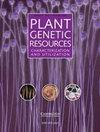Molecular cytology identification of 22 sugarcane germplasm clones from Sri Lanka
IF 0.7
4区 生物学
Q3 PLANT SCIENCES
Plant Genetic Resources: Characterization and Utilization
Pub Date : 2022-12-01
DOI:10.1017/S1479262123000278
引用次数: 0
Abstract
Abstract Germplasm innovation can provide materials for breeding sugarcane cultivars. Saccharum officinarum is the main source of high-sugar and high-yield genes in sugarcane breeding. ‘Nobilization’ is the theoretical basis for exploiting S. officinarum, and S. officinarum authenticity directly affects sugarcane nobility breeding efficiency. Herein, the authenticity of 22 SLC-series S. officinarum clones imported from Sri Lanka and preserved in the China National Germplasm Repository of Sugarcane (NGRS) was explored by four-primer amplification-arrested mutation PCR (ARMS PCR) and somatic chromosome number counting. The amplified bands from SLC 08 120 and SLC 08 131 were the same with those from S. officinarum clone Badila, i.e. a common band of 428 bp and a S. officinarum-specific band of 278 bp, hence they were tentatively assigned as S. officinarum clones. The other 20 SLC clones had both 278 bp (S. officinarum-specific) and 203 bp (S. spontaneum-specific) bands, which are hybrid characteristics. In addition, the chromosome numbers of SLC 08 120 and SLC 08 131 are both 80, belong to typical S. officinarum. While the chromosome numbers of the other 20 materials are ranging from 101 to 129, consistent with hybrids of S. officinarum and S. spontaneum. This molecular cytological characterization indicates that among the 22 introduced SLC-series clones, only two, SLC 08 120 and SLC 08 131, were S. officinarum. Future agronomic trait and resistance analyses could facilitate their use as crossing parents in sugarcane breeding.斯里兰卡甘蔗22个种质克隆的分子细胞学鉴定
摘要种质创新可为甘蔗品种选育提供材料。甘蔗渣是甘蔗育种中高糖高产基因的主要来源。“贵贱化”是甘蔗贵贱育种的理论基础,而贵贱化与否直接影响甘蔗贵贱育种的效率。本文采用四引物扩增-捕获突变PCR (ARMS PCR)和体细胞染色体计数方法,对从斯里兰卡进口并保存在中国甘蔗种质资源库(NGRS)的22个slc系列officinarum无性系的真伪进行了鉴定。SLC 08 120和SLC 08 131扩增的条带与巴迪拉克隆扩增的条带相同,均为428 bp的共同条带和278 bp的officinarum特异性条带,初步确定为officinarum克隆。其余20个SLC无性系均具有278 bp (S. officinarum-specific)和203 bp (S. spontanum -specific)的杂交特征。另外,SLC 08 120和SLC 08 131的染色体数均为80,属于典型的铁皮石斛。而其他20份材料的染色体数目在101 ~ 129之间,与S. officinarum和S. spontanum的杂交品种一致。分子细胞学鉴定表明,在引进的22个SLC系列无性系中,只有SLC 08 120和SLC 08 131为铁皮葡萄球菌。今后的农艺性状和抗性分析将有助于它们作为杂交亲本在甘蔗育种中的应用。
本文章由计算机程序翻译,如有差异,请以英文原文为准。
求助全文
约1分钟内获得全文
求助全文
来源期刊

Plant Genetic Resources: Characterization and Utilization
Agricultural and Biological Sciences-Agronomy and Crop Science
CiteScore
2.80
自引率
0.00%
发文量
29
审稿时长
>12 weeks
期刊介绍:
Plant Genetic Resources is an international journal which provides a forum for describing the application of novel genomic technologies, as well as their integration with established techniques, towards the understanding of the genetic variation captured in both in situ and ex situ collections of crop and non-crop plants; and for the airing of wider issues relevant to plant germplasm conservation and utilisation. We particularly welcome multi-disciplinary approaches that incorporate both a technical and a socio-economic focus. Technical aspects can cover developments in technologies of potential or demonstrated relevance to the analysis of variation and diversity at the phenotypic and genotypic levels.
 求助内容:
求助内容: 应助结果提醒方式:
应助结果提醒方式:


